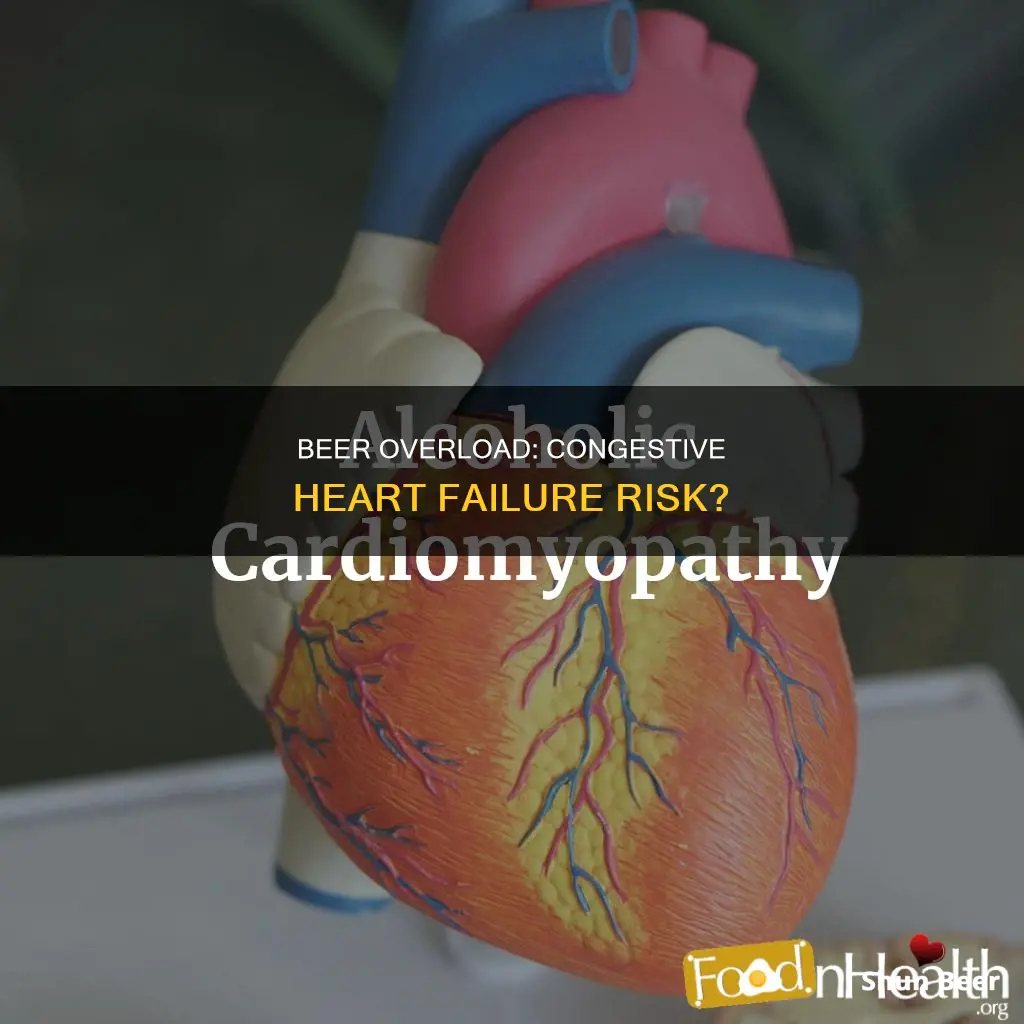
Alcohol consumption is a well-known contributor to heart problems, and drinking too much beer can indeed bring on congestive heart failure. Heavy drinking is linked to a number of poor health outcomes, including heart conditions, and excessive alcohol intake can lead to high blood pressure, heart failure, or stroke. One specific condition caused by heavy drinking is alcoholic cardiomyopathy, where the heart changes shape and can no longer pump blood effectively, leading to congestive heart failure. However, it's important to note that the link between alcohol and heart health is complex, and moderate drinking may have some benefits for heart health.
| Characteristics | Values |
|---|---|
| Can drinking too much beer bring on congestive heart failure? | Yes, drinking too much beer can lead to alcoholic cardiomyopathy, a type of congestive heart failure. |
| What is alcoholic cardiomyopathy? | Alcoholic cardiomyopathy is a condition where the heart changes shape due to long-term heavy alcohol use, leading to long-term damage and heart failure. |
| How common is alcoholic cardiomyopathy? | It occurs in about 1% to 2% of people who consume more than the recommended amount of alcohol. |
| What are the risk factors for alcoholic cardiomyopathy? | Heavy drinking, frequent binge drinking, and genetic mutations that cause slower alcohol processing can increase the risk of alcoholic cardiomyopathy. |
| What are the symptoms of alcoholic cardiomyopathy? | Chest pain, fatigue, lightheadedness, heart palpitations, increased neck vein pressure, shortness of breath, edema, decreased appetite, loss of muscle mass, and liver swelling or hardening. |
| How is alcoholic cardiomyopathy treated? | Treatment includes reducing or stopping alcohol intake, medication, and in severe cases, surgery or a heart transplant. |
| What is the recommended alcohol intake to reduce the risk of heart failure? | It is recommended to limit alcohol intake to no more than 7 drinks per week for women and no more than 14 drinks per week for men. |
What You'll Learn

Alcoholic cardiomyopathy
The risk factors for developing ACM include chronic alcohol abuse, genetic mutations that slow the processing of alcohol, and other lifestyle choices such as drug use and tobacco consumption. There is no specific amount of alcohol consumption that will lead to the development of ACM, but drinking 80 grams of alcohol or more per day for at least five years significantly increases the risk.
The condition causes the heart to change shape, as the muscles stretch and enlarge, which weakens the heart muscle and affects its ability to pump blood effectively. This reduction in blood flow leads to a decrease in the body's available oxygen supply. ACM can also disrupt the heart's electrical system and cause the formation of scar tissue, leading to potentially life-threatening irregular heart rhythms.
The symptoms of ACM include chest pain, fatigue, lightheadedness, heart palpitations, trouble breathing, edema, decreased appetite, loss of muscle mass, and swelling or hardening of the liver.
The treatment for ACM involves helping the patient reduce their alcohol intake or stop drinking entirely, along with supportive care to manage withdrawal symptoms. Abstaining from alcohol can lead to recovery in many cases, and even reducing alcohol intake to light or moderate levels can improve symptoms. Medications such as beta-blockers and diuretics are also used to treat heart rhythm problems and other symptoms of heart failure.
The prognosis for ACM depends on the amount and duration of alcohol consumption. Patients who continue to drink heavily have a poor prognosis, with mortality rates of 40-80% within 10 years. However, those who successfully quit alcohol may experience improved outcomes, including reduced hospital admissions and an improvement in heart function.
Beer and Low-Iodine Diets: What You Need to Know
You may want to see also

Alcohol's effect on blood pressure
Alcohol has both acute and chronic effects on blood pressure.
Acute effects
A single dose of alcohol can have a biphasic effect on blood pressure. It can decrease blood pressure up to 12 hours after consumption and increase blood pressure more than 13 hours after consumption.
Chronic effects
Excessive alcohol intake can lead to high blood pressure.
Managing High Blood Sugar: Beer's Impact and Your Health
You may want to see also

Alcohol's effect on weight
Alcohol can have a significant impact on weight management. While moderate alcohol consumption may not directly cause weight gain, heavy drinking is linked to weight gain and obesity. Here are some ways in which alcohol affects weight:
Empty Calories:
Alcoholic drinks are often referred to as "empty" calories, providing calories but lacking essential nutrients. A typical 12-ounce can of beer contains about 155 calories, and a 5-ounce glass of red wine has around 125 calories. Drinks with mixers like fruit juice or soda further increase the calorie count.
Preferred Fuel Source:
When alcohol is consumed, the body prioritises burning it as a fuel source before utilising glucose or lipids. This leads to excess glucose and lipids being stored as adipose tissue or fat.
Organ Function:
Excessive alcohol consumption can lead to liver damage, affecting how the body metabolises and stores carbohydrates and fats. This change in energy storage can hinder weight loss efforts.
Abdominal Fat:
While alcohol consumption doesn't directly cause increased fat stores around the abdominal area, it does impact how the body burns fat. As the liver breaks down alcohol, it prioritises this task over breaking down fat, leading to fat accumulation in the abdominal region. This abdominal fat is associated with various health complications.
Hormonal Impact:
Heavy drinking can affect the hormones that control appetite, hunger, and stress. It can impair the function of glands that release hormones, leading to potential weight gain. For example, elevated cortisol levels, often associated with heavy drinking, can increase abdominal weight gain and cravings for high-calorie foods.
Poor Food Choices:
Alcohol lowers inhibitions and impairs judgement, making it harder to resist unhealthy food choices. Additionally, alcohol can trigger hunger signals in the brain, leading to an increased urge to eat.
Sleep Disturbances:
While alcohol may seem like a good sleep aid, it is linked to poor sleep quality and duration. Sleep deprivation can contribute to weight gain by disrupting hormones related to hunger, satiety, and energy storage.
While reducing alcohol consumption may not directly lead to significant weight loss, it can help improve impulse control and reduce the risk of weight gain over time.
Beer and UTI: Is There a Link?
You may want to see also

Alcohol's interaction with medications
Alcohol interacts with medications in various ways, and these interactions can be harmful and even deadly. Firstly, alcohol can decrease the effectiveness of medications, rendering them useless or even harmful to the body. This is because alcohol can intensify medication side effects such as sleepiness, drowsiness, and light-headedness, which may interfere with concentration, driving, and operating machinery. Alcohol can also cause internal bleeding, heart problems, and breathing difficulties when mixed with certain medications.
Older people are at a particularly high risk of harmful alcohol-medication interactions. Aging slows the body's ability to break down alcohol, so it remains in the system longer, increasing the potential for adverse reactions. Older adults are also more likely to take medications that interact with alcohol, and they do not metabolize alcohol as quickly as younger adults. This means that alcohol stays in their systems longer and can have more potent effects.
Women are also at a higher risk of alcohol-related organ damage than men, as alcohol reaches a higher level in their bloodstream due to their bodies having less water. This makes women more susceptible to liver damage from alcohol.
Some common drug classes that interact with alcohol include:
- High blood pressure medication
- Sleeping pills (sedatives and hypnotics)
- Pain medications (analgesics)
- Skeletal muscle relaxants
- Cholesterol medications
- Cardiovascular (heart) medications
- Central nervous system (CNS) agents like sedatives or narcotic pain relievers
It is important to always check with a pharmacist or healthcare provider to determine if a medication can be safely combined with alcohol. Avoiding alcohol consumption until a medical professional has confirmed it is safe to mix with a particular drug is crucial.
Drinking 20 Beers: A Night to Remember or Forget?
You may want to see also

Alcohol's effect on the liver
While drinking too much beer may not directly cause congestive heart failure, it can lead to alcoholic cardiomyopathy, which is a condition where the heart changes shape due to long-term heavy alcohol use. This condition can lead to heart failure and other severe problems.
Now, here is a detailed discussion of alcohol's effects on the liver:
Alcohol's effects on the liver can be detrimental, and it is important to understand the potential risks associated with excessive drinking. Alcohol-related liver disease (ARLD) refers to liver damage caused by excess alcohol intake. The liver is a vital organ with various important functions, including filtering toxins from the blood, aiding digestion, regulating blood sugar and cholesterol levels, and fighting infections and diseases. While the liver is resilient and capable of regenerating itself, excessive alcohol consumption can overwhelm its ability to recover.
ARLD typically progresses through several stages, starting with alcoholic fatty liver disease, which is characterised by a build-up of fats in the liver. This stage rarely causes symptoms but serves as a warning sign of harmful drinking levels. The next stage is alcoholic hepatitis, a potentially serious condition that arises from alcohol misuse over a longer period or binge drinking. While mild cases are usually reversible with abstinence, severe alcoholic hepatitis is life-threatening and often leads to liver damage. The final stage is cirrhosis, where the liver becomes significantly scarred, which is generally irreversible and can lead to liver failure.
Excessive alcohol consumption can also lead to acute alcohol-related hepatitis, causing the liver to swell and become tender, killing liver cells, and resulting in a high mortality rate. Additionally, long-term damage from regular and excessive drinking can cause liver cancer, alcohol-associated liver disease, and cirrhosis.
The best way to prevent ARLD is to abstain from alcohol or drink within the recommended limits. For those with ARLD, stopping drinking is crucial, and in severe cases, a liver transplant may be required. However, even with a transplant, lifelong abstinence is necessary to prevent further damage.
Prison Beer Drinking: Is it Possible?
You may want to see also
Frequently asked questions
Yes, drinking too much beer can lead to congestive heart failure. Alcohol misuse over a long period can cause alcoholic cardiomyopathy, a type of heart failure where alcohol toxicity weakens the heart muscle.
Alcoholic cardiomyopathy is a condition where the heart changes shape due to long-term heavy alcohol use. The heart's shape changes because its muscles stretch and enlarge, which weakens the heart muscle and affects its ability to pump blood effectively.
Symptoms of alcoholic cardiomyopathy include chest pain, fatigue or weakness, feeling lightheaded or passing out, heart palpitations, increased pressure and bulging of veins in the neck, trouble breathing, edema or fluid buildup, decreased appetite, loss of muscle mass, and swelling or hardening of the liver.







